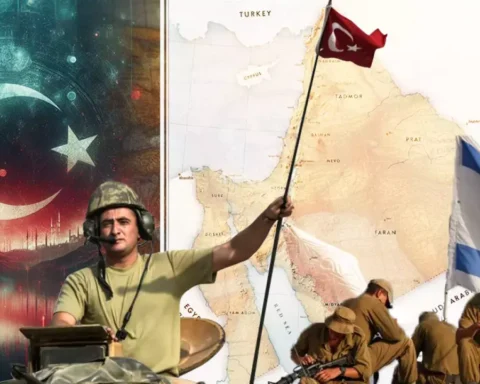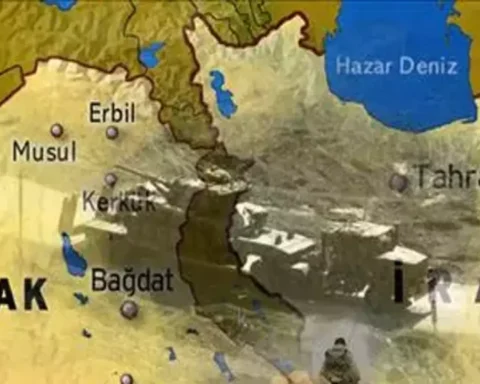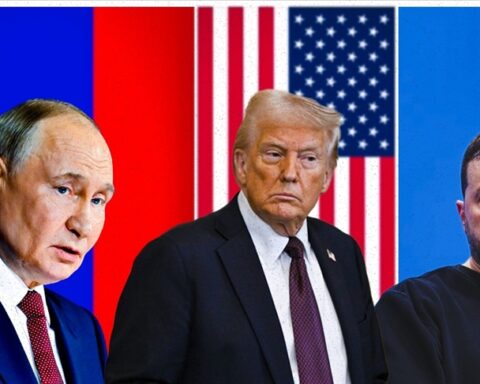A new series by Drop Site News looks at Jeffrey Epstein’s ties to Israeli intelligence and how he secretly brokered numerous deals for Israeli intelligence. Drop Site revealed that Epstein had played a role in brokering a security agreement between Israel and Mongolia and setting up a backchannel between Israel and Russia during the Syrian civil war.
Epstein had an “extensive relationship with Israeli intelligence, U.S. intelligence and the intelligence agencies of other countries as well,” says Murtaza Hussain, reporter for Drop Site News. “He was a dealmaker and a fixer at a very, very elite level.”
Transcript
This is a rush transcript. Copy may not be in its final form.
AMY GOODMAN: This is Democracy Now!, democracynow.org, The War and Peace Report. I’m Amy Goodman.
As the House of Representatives moves closer to forcing the release of the Epstein files by the Department feel Justice, we turn now to look at a new series by Drop Site News looking at Epstein’s ties to Israeli intelligence and how he secretly brokered numerous deals for Israeli intelligence.
On Tuesday, Drop Site revealed an Israeli spy stayed for weeks at a time with Epstein in Manhattan. Drop Site has also looked at Epstein’s role brokering a security agreement between Israel and Mongolia and Epstein’s role in setting up a backchannel between Israel and Russia on Syria.
This all comes as CNN’s reveal today, Epstein mentioned Donald Trump by name multiple times in private correspondence over the last 15 years, according to newly released emails from Democrats in the House Oversight Committee.
CNN’s reporting the email show Epstein asserts Trump spent significant time with a woman whom Oversight Democrats describe as a victim of Epstein sex trafficking. We’re joined now by Drop Site’s Murtaza Hussain, who’s been reporting on Epstein with his colleague, Ryan Grim.
Murtaza, welcome back to Democracy Now!. Explain what you feel the media is not covering. What is the role of Jeffrey Epstein when it comes to U.S. foreign policy?
MURTAZA HUSSAIN: There’s been a lot of justifiable focus on Epstein’s very grave crimes and facilitation of the crimes of others related to sex trafficking and sex abuse, but one critical aspect of the story that’s not been covered is Epstein’s own relationships to foreign governments, the U.S. government and particularly foreign intelligence agencies.
Now, this information is not entirely private; a lot of it is out there, actually, in House disclosures, as parts of certain lawsuits against Epstein or over Epstein’s activities over the past few years and in a few databases of leaked emails from certain figures around the world which have come out showing extensive contact with Epstein.
So, I think that a lot of the coverage of him so far, to date, at least, it’s focused, again, on salacious details of his life and the crimes he was involved in related to minors, women, but the other aspect, the political aspect, who he was and the role he played at this very high level, facilitating deals, interacting and liaising with intelligence agencies in different parts of the world, has not been covered.
We don’t know exactly who Epstein was specifically to be in the position to commit the crimes that he was doing, and our story’s aiming to focus and shedding light upon one particular aspect, which is Epstein’s extensive relationship with Israeli intelligence, U.S. intelligence, and the intelligence agencies of other countries as well, too. He was a dealmaker and a fixer at a very, very elite level, and he was making deals that would ultimately wind up, in some cases, being signed as formal security agreements between the government of Israel and other countries.
That’s what our series is focusing on right now, and it’s just coming across naturally looking at the information contained in the publicly available data about his communications over the past – during the period of about 2013 to 2016.
AMY GOODMAN: So, tell us who Yoni Koren is. You reveal that this senior Israeli intelligence officer lives in one of Epstein’s apartments, had close personal ties to former CIA director Leon Panetta. Can you talk about what specific intelligence-gathering operations you believe that Koren was conducting from Epstein’s apartment? And also, the relationship between Jeffrey Epstein and the former prime minister of Israel, Ehud Barak, which has been documented again and again.
MURTAZA HUSSAIN: So, a lot of the information we have now coming out about these intelligence ties do come from private correspondence between Barak and Epstein, which were leaked by hackers some years ago and posted online, but have never really been analyzed in great detail but shed profound light on Epstein’s ties not just to Barak, but officials all over the world and foreign governments in Africa, in Central Asia, in Europe, in Russia, whom he was helping connect Barak with.
Interestingly, Barak was relying on Epstein’s support rather than vice versa, despite the fact that Barak was a very powerful figure in the Israeli security establishment. And so, these emails, in addition to House disclosures, which also point to the same information, show that this intelligence agent, who was a longtime military intelligence agent in Israel, who was Barak’s chief aide for many years, lived at Epstein’s house for significant stretches of time, weeks at a time, between this period of 2013 to 2015.
He was staying at Epstein’s house. We don’t know specifically from the communications what they may have been working on or what his role may have been there, the reason he was staying at his house. Barak would also stay at his house sometimes to hold meetings and to do business in New York. That was facilitated by that. But we do see that they were corresponding, and at one point, Epstein does transfer money to Koren.
And there was also communication between Barak and Koren in the inbox which we believe is coded communication, perhaps referring to dead drops of information or something else in New York City that they were engaged in. It’s hard to tell because part of the reason that this correspondence is interesting is that we knew from the Snowden disclosures many years ago that Barak and Koren were being surveilled by the NSA in New York around this time or in the United States around this time.
So, whatever they were doing with Epstein in his house, in New York, amongst each other, with money, with sharing information, or data, or packages or something else, it was taking place in this period. And again, the interesting thing is that even if one would not look at the emails and keep those separate, this information’s in the House disclosures. In Jeffrey Epstein’s calendars, it’s mentioned that Koren’s coming and going from his home, and the day of his departure, how long he was staying for.
So, this is stuff that the broader media could be covering, it’s just escaped attention for reasons which one could speculate, or it was hard to say exactly. But we’re going to continue drilling down on this, not shying away from the political implications of his activities, Epstein’s activities, and the ties he had with powerful figures like Barak and intelligence agents like Koren.
AMY GOODMAN: The leaked emails show that the former prime minister, Ehud Barak, bookmarked a private initiative with Oracle’s Larry Ellison. Can you talk about the significance of this initiative?
MURTAZA HUSSAIN: So, what we saw from the email is effectively that around the time that Epstein and Barak were corresponding, that Koren’s activities in New York at Epstein’s home were going on, Barak himself had gone on to have a separate meeting with Larry Ellison. Now, Larry Ellison is a very well-known pro-Israel donor. He’s a billionaire and the founder of Oracle. Currently, he’s involved in, with his son, buying up much of the American media.
We’ve done other reporting on Ellison, drawing not from this database but from a separate database of communications which were also leaked and posted on the website called Distributed Denial of Secrets, and they show that Ellison had been very involved with the Israeli government in other facets, helping, in a way, shape the American political system for Israel. He was helping vet political candidates at the behest of Israeli officials for their favorability towards Israel to determine who he’d give money to.
So, we don’t know from the correspondence with Barak what he was discussing with Ellison at that time or what the private initiative may have been. There’s no further – not everything was discussed by email, a lot of things were discussed by phone, so not everything is documented in that manner. But we do know that Ellison was very closely involved in promoting the perceived interests of Israel in the United States at that time, and Barak was doing the same thing.
And interestingly, Epstein was doing the same thing. Epstein was helping Barak facilitate Israeli interests around the world, different countries, helping him refine his pitches, connecting him with people to help pursue the geopolitical interests of the Israeli government, and this is all coming as one parcel of that. And so, at Barak’s meeting with Ellison, one can imagine it would have something to do with the ongoing efforts he’d been engaged in.
AMY GOODMAN: And the leaked emails showing Jeffrey Epstein and Barak securing a private meeting with Vladimir Putin in 2013 to orchestrate the removal of Bashar al-Assad, it didn’t succeed, but in an email exchange, Epstein wrote to the former prime minister of Israel, “With civil unrest exploding in Ukraine, Syria, Somalia, Libya, and the desperation of those in power, isn’t this perfect for you?” Barak replied, “You’re right, in a way, but not simple to transform it into a cashflow. A subject for Saturday,” Ehud Barak wrote. Can you talk about, as we wrap up, that relationship between Jeffrey Epstein and Ehud Barak, attempting to profit from the war in Syria?
MURTAZA HUSSAIN: Well, that email that you just read out is a very important email because it kind of explains the broader thesis that Epstein and Barak had been operating under and what they’d been doing exactly.
They’d been going around the world, pitching – Epstein had been pitching Barak as someone who could solve the security problems of different countries and introducing him to powerful people in these countries – we’re going to cover more of those in the weeks and months to come – and telling that that Barak, through his connections with the Israeli intelligence and Israeli intelligence-linked surveillance technology firms especially, could help introduce him to these countries, embed them, and then later sign formal deals with Israel.
We did a story about this, how it manifested in Côte d’Ivoire, also Mongolia. In this tie with Russia, it’s very fascinating because Epstein was the one who was arranging a backchannel between Barak and Putin to discuss this deal to remove Bashar al-Assad and replace him with a pro-Russian dictator who Israel was also OK with.
That didn’t come to pass, but I think the interactions show the tremendous access that Epstein enjoyed not just with Israeli officials or U.S. officials but also Russian officials. He had the ability to get meetings with Putin, he met with Putin himself on numerous occasions, according to his own correspondence. And that is something that – how did that come about? What was the background behind that? We don’t know.
But we do know that at the very least, Epstein was somebody who considered himself to have the ability to access high-level Russian officials. He claimed in the emails, as I mentioned, that he met Putin, or Putin asked to meet him. That’s Epstein’s own depiction of the interaction. But he did absolutely have the juice to get Barak in the room with Putin, and the funny thing is that Barak had to rely on Epstein for that, to create that backchannel. It shows the tremendous influence and power that Epstein had, which does not really – we have not had a full accounting of that. That has not been accounted for in the public understanding of this case.
We hope to shed more light on that in our own reporting, but we need the government, we need other news outlets to pay attention to this and put together the pieces of who Epstein was and the role he played as an international dealmaker.
*AMY GOODMAN: Murtaza Hussain, I want to thank you for being with us, National Security Reporter at Drop Site News. We’ll link to your new articles about Jeffrey Epstein’s ties to Israeli intelligence.






